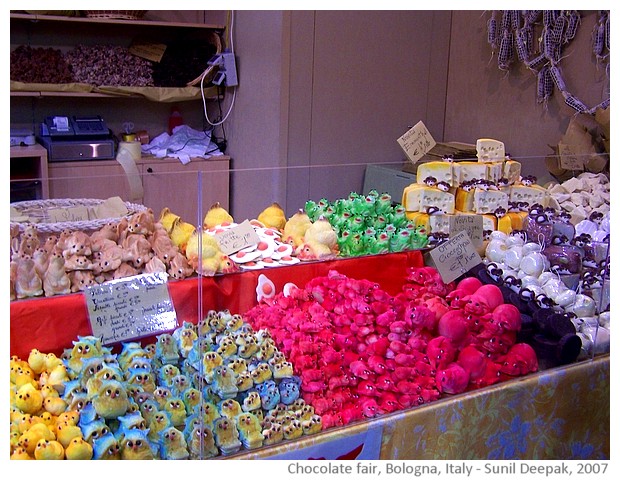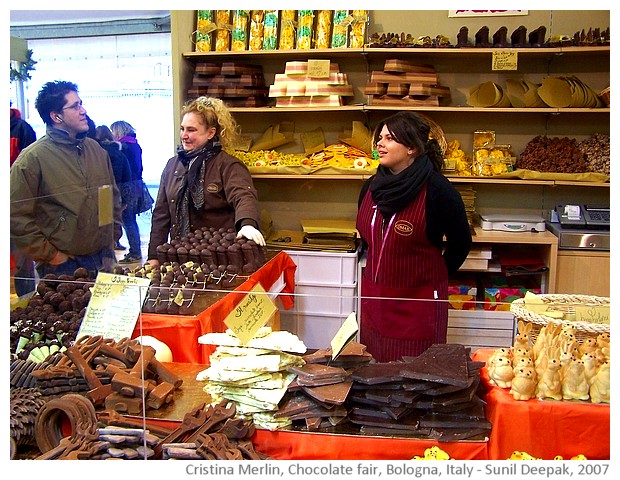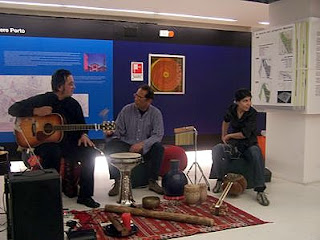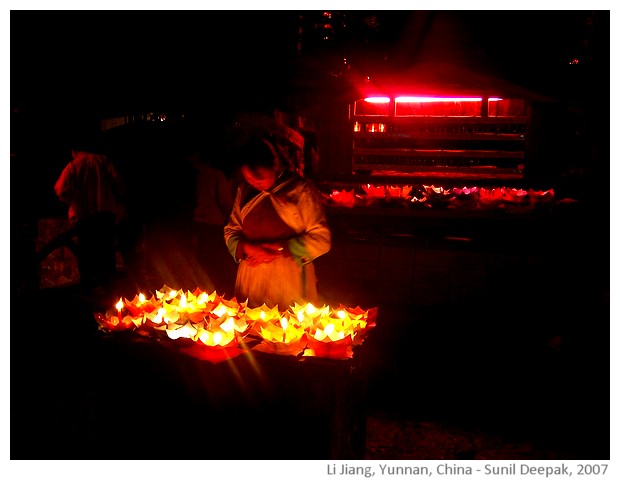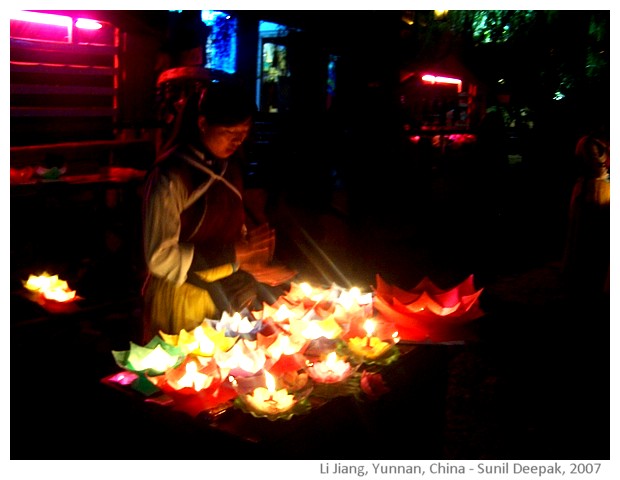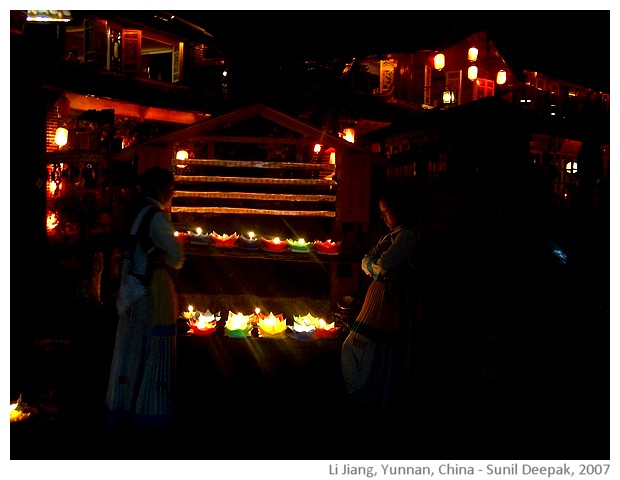Medha Patkar, the famous activist from India fighting for the rights of poor and voiceless persons, was in Bologna at a meeting organised by CGIL, the Italian workers union. I was translating her speech from English to Italian in this meeting.
I agree with some of her points regarding SEZs, the corruption that pervades most of our system in India, the lack of care about what happens to the poor and marginalised persons. I also agree that the present dominating idea of development is result of a particular view point of developed world that has its roots in colonial past, industrialization and in a belief that nature is for man’s exploitation and thus for most persons the more things you have the better it would be.
However, I am not sure if poor persons, just because they are poor, would be happy with another idea of development. Activists like Medha speak of lofty ideas, such as the ideas of self-contained mutually dependent small communities with limited material needs envisioned by Gandhi and some other thinkers. Perhaps it is the globalisation or may be a sign of changing times, but I feel that very often all of us, rich and poor, often share the kind of dreams that are based on material wealth.
I have met Medha a couple of times, and she comes across as a very sincere person. However, sometimes I feel that she is too self-righteous and non-realistic in some of her ideas. Anyway, here are some points from Medha's speech in Bologna.
***
I come from the National Alliance of the People’s Movements in India and also from the struggles in the river valley of Narmada. These years and decades long struggles are still on and have been facing newer challenges because the whole paradigm to which the state and the corporates are committed to, is certainly bringing an onslaught on the population including the indigenous people, farmers, the working class people, artisans, the fish workers and almost 95 or more percent of the working classes.
***
I come from the National Alliance of the People’s Movements in India and also from the struggles in the river valley of Narmada. These years and decades long struggles are still on and have been facing newer challenges because the whole paradigm to which the state and the corporates are committed to, is certainly bringing an onslaught on the population including the indigenous people, farmers, the working class people, artisans, the fish workers and almost 95 or more percent of the working classes.
But it is not only the case of a dam in one single river valley, apply it to various development projects. We realise it that people are bound to assert their right to the local resources which are taken away in the name of development. So sections of the civil society and of course the state, come out with certain symbols of development which fits in their paradigm like large dams or large factories. We question it, from the point of view of how the process of taking away the resources (works), and diverting of these resources from one kind of economy to another kind of economy. We raise this question.
We are also questioning the centralised-based development paradigm and planning process. When centres are in the capitals of the nation states, the communities, the rural as well as the urban communities questioned, “Who decides what is development”? And through what democratic or undemocratic procedures and processes do they impose these plans upon us? It was also bringing out the ultimate ways of managing the resources, beginning with their small units that are the communities, which are also the ecological units. So that there will be no displacement and eviction of people from their cultural, environmental milieu and also from there own kinds of life-styles and economies.
It was one story when this was within the boundaries of one nation state. With the whole paradigm of globalisation, corporatisation and privatisation, it has attained unprecedented scale and unprecedented force, including the use of physical force that the state maintained but also the various factories of the corporate powers which have infested the state itself. The nexus between the state and the corporate power, it wants every piece of land and they are eating our resources in the name of industrialisation, in the name of progress and development. It is not just the rivers, but also ground waters, reservoirs that are handed over to the companies such as Coca Cola, the mineral water bottling plants. The people living on the land with the water resources are waging battles, if not wars. In the name of industrialisation, in the present paradigm, the land is opened to all industries including like your Fiat company from Italy itself.
This has taken a new turn by the states announcing the policies and laws of Special Economic Zones (SEZs). These are officially known as “foreign territories” within Indian territory. These SEZs are large chunks of lands which are acquired partly by the state and partly purchased by the companies, who can purchase not just small farms but whole districts, areas as big as the regions (in Italy) including hills and valleys, because they have already earned so much profit. These zones are the ones which give all concessions and not less than 21 laws for the corporates. They are cutting on the labour legislations which were earned through decade long struggles by the labourers and workers.
I belong since birth to the family of a labour union leader, who was freedom fighter as well and hence I know how hard earned are those labour legislation and yet with the rush of a pen, the legislations are declared “not applicable” to the corporates, that are allowed to operate not just with free trade but also with free operations. With special judges, with no local self-government, even those elected and recognised are not allowed to function in these zones, like the Panchayats. So with these kinds of zones coming up the corporates are not just confident, but are arrogant and aggressive in taking away the lands and every thing attached to the lands.
West Bengal is a left front ruled state for the last more than 30 years. We have always been allies of the left front parties. At the world social forum, at various for a where we raised our voice jointly against the neoliberal paradigm. If you want to have a look at the resolution passed by the parties, various partners and allies in the left front in India – Communist party of India Marxist, Communist Party of India CPI, the Revolutionary Socialist party, the Forward Block, if you look at these four parties, you will find that they unequivocally question the neoliberal paradigm. They question the World Bank, IMF, WTO, they support Cuba and Venezuela and the changes in the Latin American countries such as Brazil and they vow for the people’s rights and the non corporated state.
And yet in West Bengal problems are there, coming up in place to place. In Singur there was a forced acquisition of about thousand acres of land, 997 acres, for a project that was known as Tata’s small car project.
The industries minister of West Bengal told us, when we held the public hearing on the invitation that came from the people, myself along with Mahashweta devi, the well known literary person in India, others like former justice Sengupta and also the radical left wing intellectuals, we all held a public hearing and heard the people. The people had an unanimous voice in opposition to the project. People said that whatever needs to be done, has to be done. The corporates and before the corporates, the faith has to come to us, we are the communities, we have the power and democratic constitutional right and they should say what it is that they are wanting to have, why that project, what is that project going to bring to the nation and to themselves, how are they going to get a share, whether they are going to get it or not? But the Government absolutely said no, that they are not ready to disclose the information. So we as the members of the panel placed our demands to the industries minister and had dialogue with the chief minister also. We were shocked to get the answer such as, “Oh in the neoliberal economy, after all what can we do? We have to bargain with the companies, if at all. We have to accept the land which they choose, we can not choose the land to be given to the industries. If we don’t allow them to get the land which they want they would go away to some other state. Even for the rehabilitation, we have no policy as yet here. We will in the process try to talk to Tata so that we can have some package evolved..”. We were shocked to hear this from the left front leader.
As the struggle began, it has already faced some repression, some of the opposition political parties were involved, so the Government started saying that this is all political. When we came in as people’s movement, they could not say that because we are not for the typical political or electoral politics. We are in the people’s politics. But we don’t consider the parties as untouchables, but we feel that movements are political in themselves. When we as the farmers, fish workers, the displaced people, some of the unorganised sector workers, unions, some of the organised sector worker union, we all said raised the voice of support to people of Singur, they started directing the repression to us.
We are also questioning the centralised-based development paradigm and planning process. When centres are in the capitals of the nation states, the communities, the rural as well as the urban communities questioned, “Who decides what is development”? And through what democratic or undemocratic procedures and processes do they impose these plans upon us? It was also bringing out the ultimate ways of managing the resources, beginning with their small units that are the communities, which are also the ecological units. So that there will be no displacement and eviction of people from their cultural, environmental milieu and also from there own kinds of life-styles and economies.
It was one story when this was within the boundaries of one nation state. With the whole paradigm of globalisation, corporatisation and privatisation, it has attained unprecedented scale and unprecedented force, including the use of physical force that the state maintained but also the various factories of the corporate powers which have infested the state itself. The nexus between the state and the corporate power, it wants every piece of land and they are eating our resources in the name of industrialisation, in the name of progress and development. It is not just the rivers, but also ground waters, reservoirs that are handed over to the companies such as Coca Cola, the mineral water bottling plants. The people living on the land with the water resources are waging battles, if not wars. In the name of industrialisation, in the present paradigm, the land is opened to all industries including like your Fiat company from Italy itself.
This has taken a new turn by the states announcing the policies and laws of Special Economic Zones (SEZs). These are officially known as “foreign territories” within Indian territory. These SEZs are large chunks of lands which are acquired partly by the state and partly purchased by the companies, who can purchase not just small farms but whole districts, areas as big as the regions (in Italy) including hills and valleys, because they have already earned so much profit. These zones are the ones which give all concessions and not less than 21 laws for the corporates. They are cutting on the labour legislations which were earned through decade long struggles by the labourers and workers.
I belong since birth to the family of a labour union leader, who was freedom fighter as well and hence I know how hard earned are those labour legislation and yet with the rush of a pen, the legislations are declared “not applicable” to the corporates, that are allowed to operate not just with free trade but also with free operations. With special judges, with no local self-government, even those elected and recognised are not allowed to function in these zones, like the Panchayats. So with these kinds of zones coming up the corporates are not just confident, but are arrogant and aggressive in taking away the lands and every thing attached to the lands.
West Bengal is a left front ruled state for the last more than 30 years. We have always been allies of the left front parties. At the world social forum, at various for a where we raised our voice jointly against the neoliberal paradigm. If you want to have a look at the resolution passed by the parties, various partners and allies in the left front in India – Communist party of India Marxist, Communist Party of India CPI, the Revolutionary Socialist party, the Forward Block, if you look at these four parties, you will find that they unequivocally question the neoliberal paradigm. They question the World Bank, IMF, WTO, they support Cuba and Venezuela and the changes in the Latin American countries such as Brazil and they vow for the people’s rights and the non corporated state.
And yet in West Bengal problems are there, coming up in place to place. In Singur there was a forced acquisition of about thousand acres of land, 997 acres, for a project that was known as Tata’s small car project.
The industries minister of West Bengal told us, when we held the public hearing on the invitation that came from the people, myself along with Mahashweta devi, the well known literary person in India, others like former justice Sengupta and also the radical left wing intellectuals, we all held a public hearing and heard the people. The people had an unanimous voice in opposition to the project. People said that whatever needs to be done, has to be done. The corporates and before the corporates, the faith has to come to us, we are the communities, we have the power and democratic constitutional right and they should say what it is that they are wanting to have, why that project, what is that project going to bring to the nation and to themselves, how are they going to get a share, whether they are going to get it or not? But the Government absolutely said no, that they are not ready to disclose the information. So we as the members of the panel placed our demands to the industries minister and had dialogue with the chief minister also. We were shocked to get the answer such as, “Oh in the neoliberal economy, after all what can we do? We have to bargain with the companies, if at all. We have to accept the land which they choose, we can not choose the land to be given to the industries. If we don’t allow them to get the land which they want they would go away to some other state. Even for the rehabilitation, we have no policy as yet here. We will in the process try to talk to Tata so that we can have some package evolved..”. We were shocked to hear this from the left front leader.
As the struggle began, it has already faced some repression, some of the opposition political parties were involved, so the Government started saying that this is all political. When we came in as people’s movement, they could not say that because we are not for the typical political or electoral politics. We are in the people’s politics. But we don’t consider the parties as untouchables, but we feel that movements are political in themselves. When we as the farmers, fish workers, the displaced people, some of the unorganised sector workers, unions, some of the organised sector worker union, we all said raised the voice of support to people of Singur, they started directing the repression to us.
*****





